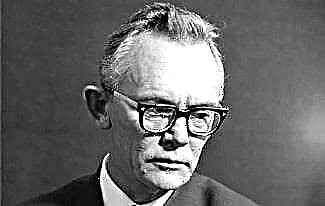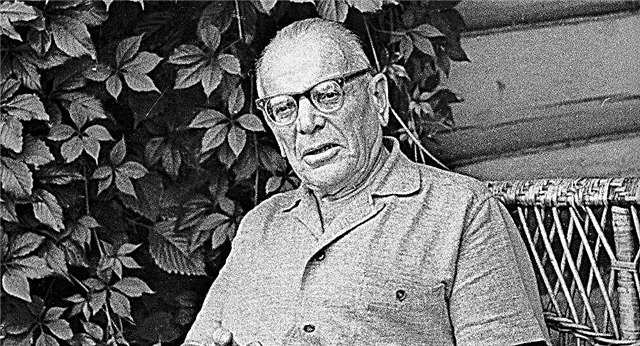John Wycliffe (Wyclif) (c. 1320 or 1324 - 1384) - English theologian, professor at Oxford University and the founder of the Wycliffe doctrine, whose ideas influenced the Lollard popular movement.
Reformer and predecessor of Protestantism, often referred to as the "morning star of the Reformation", who laid the foundations for the ideas of the forthcoming Reformation in Europe.

Wycliffe is the first translator of the Bible into Middle English. Author of many works related to logic and philosophy. Wycliffe's theological writings were condemned by the Catholic Church and, as a consequence, recognized as heretical.
There are many interesting facts in Wycliffe's biography, which we will tell about in this article.
So, here is a short biography of John Wycliffe.
Biography of Wycliffe
John Wycliffe was born at the turn of 1320-1324 in English Yorkshire. He grew up and was brought up in the family of a poor nobleman. It is curious that the family received its surname in honor of the village of Wycliffe-on-Tees.
Childhood and youth
At the age of 16, he became a student at Oxford University, where he eventually received his doctorate in theology. After becoming a certified theologian, he remained to teach at his native university.
In 1360, John Wycliffe was entrusted with the position of Master (head) of Balliol College of the same institution. During this time of his biography, he was engaged in writing, showing interest in physics, mathematics, logic, astronomy and other sciences.
The man became interested in theology after negotiations with the diplomatic representative of Pope Gregory XI in 1374. Wycliffe criticized the abuse of power in England by the church. It is worth noting that the English monarch was dissatisfied with the dependence on the papacy, which sided with France during the Hundred Years War.
In the subsequent years of his biography, John with even more persistence condemned the Catholic clergy, for their greed and love of money. He supported his position with passages from the Bible.

In particular, Wycliffe stated that neither Jesus nor his followers had any property and did not participate in politics. All this could not go unnoticed. In 1377, the theologian was prosecuted by the bishop of London for prelates on charges of anti-papal attacks.
Wycliffe was saved by the intercession of the Duke and the great landowner John of Gaunt, who began to vehemently defend him before the judges. As a result, this led to confusion and the collapse of the court.
The following year, the Pope issued a bull that condemned the views of the Englishman, but thanks to the efforts of the royal court and Oxford University, John was able to avoid arrest for his beliefs. The death of Gregory XI and the papal schism that followed, saved the man from subsequent persecution.
After an unsuccessful peasant revolt in 1381, courtiers and other high-ranking personalities ceased to patronize Wycliffe. This led to a serious threat hanging over his life.
Under pressure from the Catholic clergy, Oxford theologians recognized John's 12 theses as heretical. As a result, the author of the theses and his associates were dismissed from the university and soon excommunicated.
After that, Wycliffe had to constantly hide from the persecution of Catholics. After settling in Lutterworth, he devoted his life to translating the Bible into English. Then he wrote his main work "Trialogue", where he presented his own reformist ideas.
Key ideas
In 1376, John Wycliffe began to openly and constructively criticize the actions of the Catholic Church, lecturing at Oxford. He argued that only righteousness can give the right to possession and property.
In turn, the unrighteous clergy cannot have such a right, which means that all decisions must come directly from the secular authorities.

In addition, John stated that the very presence of property in the papacy speaks of his sinful inclination, since Christ and his disciples did not own it, but rather, on the contrary, called for having only the most necessary, and sharing the rest with the poor.
Such antipope statements caused a storm of indignation among all the clergy, with the exception of the poor orders. Wycliffe criticized the claims of the Catholics to collect tribute from England and defended the monarch's right to seize church property. In this regard, many of his ideas were favorably received by the royal court.
In addition to this, John Wycliffe denied the following teachings and traditions of Catholicism:
- the doctrine of purgatory;
- sale of indulgences (exemption from punishment for sins);
- the sacrament of blessing;
- confession before a priest (urged to repent directly before God);
- the sacrament of transubstantiation (the belief that bread and wine in the process of mass literally turn into the body and blood of Jesus Christ).
Wycliffe argued that any person is directly (without the help of the church) connected with the Most High. But in order for this connection to be the strongest, he called for translating the Bible from Latin into different languages so that people could read it on their own and develop their relationship with the Creator.
Over the years of his biography, John Wycliffe wrote many theological works in which he wrote that the monarch is the governor of the Almighty, therefore the bishops should be subordinate to the king.
When the Great Western Schism struck in 1378, the reformer began to identify the Pope with the Antichrist. John said that the acceptance of the gift of Constantine made all subsequent popes apostates. At the same time, he urged all like-minded people to take up the translation of the Bible into English. Years later, he would completely translate the Bible from Latin into English.
After such "seditious" statements, Wycliffe was even more attacked by the church. Moreover, the Catholics forced a small group of his followers to renounce the theologian's ideas.
However, by that time, the teachings of John Wycliffe had spread far beyond the city limits and survived thanks to the efforts of the zealous, but poorly educated Lollards. By the way, the Lollards were wandering preachers who were often called "poor priests" because they wore simple clothes, walked barefoot, and had no property.

The Lollards were also severely persecuted, but they continued to engage in educational activities. Wanting the Scriptures to touch the hearts of the common people, they traveled all over England on foot, preaching to their countrymen.
Often the Lollards would read portions of Wycliffe's Bible to people and leave handwritten copies to them. The teachings of the Englishman became widespread among the common people throughout mainland Europe.
His views were especially popular in the Czech Republic, where they were taken up by the theologian-reformer Jan Hus and his followers, the Hussites. In 1415, by a decree of the Council of Constance, Wycliffe and Huss were declared heretics, as a result of which the latter was burned at the stake.
Death
John Wycliffe died of a stroke on December 31, 1384. 44 years later, by the decision of the Cathedral of Constance, the remains of Wycliffe were dug out of the ground and burned. Wycliffe is named after Wycliffe Bible Translations, founded in 1942 and dedicated to Bible translation.
Wycliffe Photos














